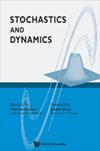具有Neumann边界条件的线性反应亚扩散方程的最优估计
IF 0.8
4区 数学
Q3 STATISTICS & PROBABILITY
引用次数: 0
摘要
本文应用经典非一致L1公式和紧致差分格式求解具有Neumann边界条件的线性分数阶系统。提出了一种新颖、简单的离散极大范数收敛性分析论证策略。此外,根据所得系数矩阵的特殊性质,采用对角化技术和离散余弦变换(DCT)加快了该方法的收敛速度。此外,数值格式也推广到三维(3D)情况。给出了几个数值实验来支持我们的发现。本文章由计算机程序翻译,如有差异,请以英文原文为准。
A Optimal Estimate for Linear Reaction Subdiffusion Equations with Neumann Boundary Conditions
In this paper, we apply classical non-uniform L1 formula and the compact difference scheme for solving linear fractional systems with Neumann boundary conditions. A novelty and simple demonstration strategy is presented on the convergence analysis in the discrete maximum norm. Moreover, based on the special properties of the resulting coefficient matrix, diagonalization technique and discrete cosine transform (DCT) are adopted to speed up the convergence rate of the proposed method. In addition, the numerical scheme is also extended to the three-dimensional (3D) case. Several numerical experiments are given to support our findings.
求助全文
通过发布文献求助,成功后即可免费获取论文全文。
去求助
来源期刊

Stochastics and Dynamics
数学-统计学与概率论
CiteScore
1.70
自引率
0.00%
发文量
49
审稿时长
>12 weeks
期刊介绍:
This interdisciplinary journal is devoted to publishing high quality papers in modeling, analyzing, quantifying and predicting stochastic phenomena in science and engineering from a dynamical system''s point of view.
Papers can be about theory, experiments, algorithms, numerical simulation and applications. Papers studying the dynamics of stochastic phenomena by means of random or stochastic ordinary, partial or functional differential equations or random mappings are particularly welcome, and so are studies of stochasticity in deterministic systems.
 求助内容:
求助内容: 应助结果提醒方式:
应助结果提醒方式:


